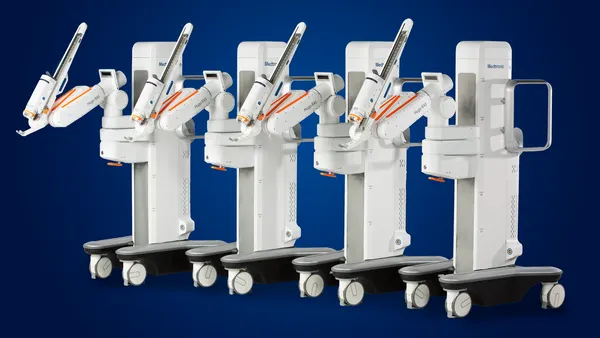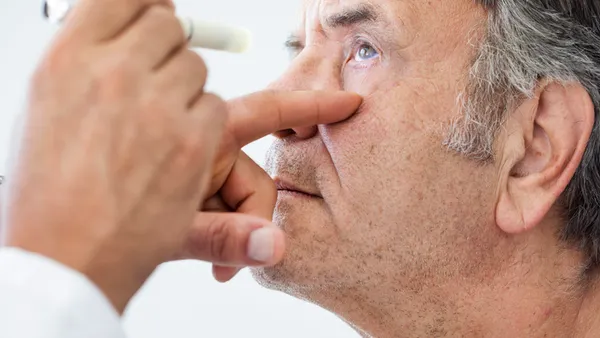Dive Brief:
- Expert advisers to the FDA, patients and manufacturers agreed Tuesday the informed consent process for breast implant procedures needs improvement — but exactly how to get there is yet to be defined. Dozens of patients testified not understanding the inevitability of reoperations, the risks for implant associated anaplastic large cell lymphoma or systemic symptoms beyond local complications.
- While panelists said that manufacturers' lengthy, fine-printed booklets could be more user-friendly, they noted companies have been laying out the heightened risk for cancer, and that responsibility for a sufficient informed consent process may ultimately rest with surgeons.
- The panel also loosely recommended randomized controlled study of the patient-coined 'breast implant illness' in hopes of eventually better defining it, which one panelist described as a "poorly characterized set of disorders." Several others noted that the more than 80 symptoms linked to breast implants make study design a challenge.
Dive Insight:
Panelists on the non-voting committee floated a range of ideas for FDA and healthcare providers on day two of the meeting over renewed attention of the safety of breast implants, the silicone gel-filled variety of which were placed under moratorium in 1992 but allowed back on the market for a full range of procedures in 2006.
Among these include testing tissues removed in 'explant' surgeries for undiagnosed infection or cancer, better informing other medical specialists to ask about implants during patient evaluations, publicizing implant ingredient lists, developing research to better define BII, and updating silent rupture screening guidelines to account for the financial burden of frequent MRIs.
One plastic surgeon panelist implored FDA to look into removing a subset of textured implants from the market, mimicking action taken in Europe against Allergan's textured products.
CDRH division of surgical devices director Binita Ashar called adverse reactions to breast implants a "diagnostic odyssey" for patients, and equally frustrating for healthcare providers. Panel chair and former American Board of Surgery director Frank Lewis noted the panel was missing rheumatologists or immunologists, specialists who may be most helpful in advising FDA on how to best research breast implant patients' symptoms.
Several patient advocates calling for mandatory informed consent said they want to continue to have representation in FDA's work on breast implant safety, which could include development of a standardized patient checklist and improved patient and surgeon education protocols.
While the idea of working toward better informed consent was non-controversial, some panelists noted achieving significantly better outcomes may be easier said than done.
"This is trickier I think than we're letting on … I'm all for informed consent, who wouldn't be?" said Marc Lippman, an oncologist at Georgetown University Medical Center.
"It's not like people aren't trying to do this," he said.
Manufacturers already provide required information about BIA-ALCL and other complications in their patient materials. Presentations from manufacturers confirmed they provide medical updates and general outreach to surgical societies, and offer a range of patient materials in doctors' offices, online and on social media, including tear-out checklists.
Despite companies like Allergan saying it used focus groups to develop its educational materials, Lewis alleged the manufacturers' informational resources were "constructed to provide legal protection," not to inform patients in the best way.
"We realize there might be a gap between what we're providing and what information is reaching the patients," said Mentor representative Raina Dauria.
Committee members agreed on key elements to include in an optimal informed consent process or defined patient checklist. These include that breast implants are not lifetime devices but do require a lifetime of medical follow-up; that there could be predisposing factors to breast implant-associated illness, many of which are still untested and unknown; and the importance of examining personal and family history of allergies and autoimmune disease in considering implants.
Panelists did not reach a consensus on advising FDA's actions going forward.
Beyond being a facilitator for stakeholder discussions and potentially issuing a black box warning, which some panelists noted usually gets thrown out before a patient would see it, some experts said that at the end of the day, healthcare providers are the last line of defense for ensuring patients are thoroughly informed.
Several members of the American Society of Plastic Surgeons as well as the American Society for Aesthetic Plastic Surgeons also made a pitch that breast implant manufacturers sell only to board-certified plastic surgeons. While patients weren't opposed to the recommendation, patient and advocate Anne Ziegenhorn noted that the vast majority of the harmed women attending the meeting likely received their care from a board-certified plastic surgeon.
ASAPS also teased a real-world evidence technology it's been developing called the Aesthetic Neural Network, which in addition to providing an easier way for surgeons to upload deidentified data and compare outcomes to peers' practices, will also have a patient-centered app for flagging symptoms that arise.
Addressing specific questions laid out by FDA prior to the meeting, the panel recommended the agency amend a 2006 advisory committee's advice that women with breast implants get an MRI three years after implant placement and every two years thereafter to screen for silent implant rupture. The 2019 panel heard complaints that high out-of-pocket costs associated with MRIs and a lack of motivation among healthy, asymptomatic patients to get screened has resulted in single-digit screening compliance rates, per manufacturer data.
The panel also debated just how serious it is to catch silent rupture early when patients are asymptomatic, considering that many patients testified the implants they had removed due to systemic symptoms were actually intact upon explant. Additionally, FDA cited data showing rupture rates don't increase until years four to six post-implant.
All of this in mind, the panel recommended FDA update its guidelines to say that three years is too early to test for rupture, and that in asymptomatic patients, using ultrasound as a less expensive alternative at five to six years post-implant is acceptable. For symptomatic patients, panelists said MRI may still be a better choice, as it's been established as the best method for screening implant ruptures.
Regarding the use of surgical mesh in breast reconstruction, FDA clarified it was mostly seeking guidance on acellular dermal matrices (ADMs) rather than synthetic meshes. Allergan is among the manufacturers of ADMs, having acquired regenerative medicine company LifeCell in 2017 for $2.9 billion. While panelists considered the risks of incorporating ADMs somewhat low, they said patients should be informed if it's being used in their procedure and told it's not indicated for this use by FDA. Some panelists expressed concern that the efficacy or benefit of the mesh hasn't yet been proven great enough to warrant its use. Regardless, panelists said it would make sense to incorporate breast surgeries using mesh into the National Breast Implant Registry.











